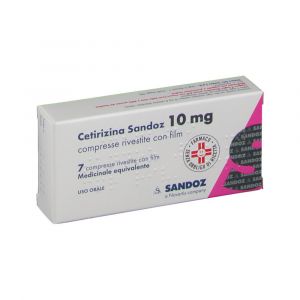Ship in Europe, Find out rates!

Cetirizine Sandoz 10 mg Rhinitis 7 Coated Tablets
SANDOZ
Tablets based on cetirizine dihydrochloride.
Therapeutic indications
Cetirizina Sandoz is used in the treatment of nasal and ocular symptoms of seasonal and perennial allergic rhinitis and for the symptomatic treatment of chronic idiopathic urticaria.
Dosage and Posology
The drug should be taken according to the following doses and methods:
- Children aged 6 to 12 years: 5 mg twice a day (half tablet twice a day).
- Adults and children over 12 years of age: 10 mg once daily (1 tablet).
The tablets should be taken with a glass of liquid.
- Elderly patients: based on available data, no dose reduction is required in elderly subjects with normal renal function.
- Patients with moderate to severe renal insufficiency: No data are available documenting the efficacy / safety ratio in patients with renal insufficiency. Since cetirizine is predominantly excreted via the kidney (see section 5.2), in cases where alternative treatments cannot be used, the dose intervals should be individualized according to renal function. Refer to the following table and adjust the dose as indicated. To use this dosing table, an estimate of the patient's creatinine clearance (CLcr) in ml / min is required. CLcr (ml / min) can be derived from the serum creatinine value (mg / dl) using the following formula: CLcr = [140-age (years)] x weight (kg) / 72 x serum creatinine (mg / dl )] x 0.85 for women)
Dosage adjustment for adults with impaired renal function:
- Normal ≥80 10 mg once daily
- Mild 50 - 79 10 mg once daily
- Moderate 30 - 49 5 mg once daily
- Severe <30 5 mg once every 2 days
- End-stage renal disease - Dialysis patients <10 Contraindicated
In pediatric patients with renal insufficiency, the dose will need to be individually adjusted taking into account the renal clearance, age and body weight of the patient.
Overdose
Symptoms observed following an overdose of cetirizine are mainly associated with central nervous system effects or with effects that may suggest anticholinergic activity. Following a dose of at least 5 times the recommended daily dose, the following adverse events have been reported: confusion, diarrhea, dizziness, fatigue, headache, malaise, mydriasis, pruritus, restlessness, sedation, somnolence, stupor, tachycardia, tremor and urinary retention.
A specific antidote to cetirizine is not known. In the event of an overdose, symptomatic or supportive treatment is recommended. Following recent ingestion, gastric lavage is recommended. Cetirizine is not effectively removed by dialysis.
Contraindications
- Hypersensitivity to the active substance, or to any constituent of the formulation, to hydroxyzine or to any derivative of piperazine.
- Patients with severe renal insufficiency with creatinine clearance less than 10ml / min.
Side effects
Clinical studies have shown that cetirizine at the recommended dosage has minor CNS undesirable effects, including somnolence, fatigue, dizziness and headache. In some cases, paradoxical CNS stimulation has been reported. Although cetirizine is a selective antagonist of peripheral H1 receptors and is relatively devoid of anticholinergic activity, rare cases of micturition difficulties, eye accommodation disorders and dry mouth have been reported. There have been reports of abnormal liver function with liver enzyme elevations accompanied by elevated bilirubin, most of which resolved following discontinuation of cetirizine dihydrochloride.
Pregnancy and breastfeeding
Very few clinical data on exposed pregnancies are available for cetirizine. Animal studies do not show direct or indirect harmful effects with respect to pregnancy, embryonal / fetal development, parturition or postnatal development. Prescribing to pregnant women should be done with caution.
Cetirizine is excreted in breast milk at concentrations representing 25% to 90% of those measured in plasma, depending on the sampling time after administration. Therefore, prescribing to breastfeeding women should be done with caution.
Special warnings
At therapeutic doses, there was no evidence of clinically significant interactions with alcohol (for blood alcohol levels of 0.5 g / l). However, caution is advised in case of concomitant alcohol intake. Caution is advised in patients with predisposing factors for urinary retention (e.g. spinal cord injury, prostatic hyperplasia) as cetirizine may increase the risk of urinary retention. Caution is advised in epileptic patients and in patients at risk for seizures. Allergy skin tests are inhibited by antihistamines and a wash-out period (of 3 days) is required before performing them. Patients with rare hereditary problems of galactose intolerance, the Lapp lactase deficiency or glucose-galactose malabsorption should not take cetirizine film-coated tablets.
The use of the film-coated tablet formulation is not recommended in children under 6 years of age as this formulation does not allow for appropriate dose adjustment.
Expiration and retention
Check the expiration date indicated on the package. The expiry date indicated on the package refers to the product in intact packaging, correctly stored. This medicine does not require any special storage conditions.
Warning : do not use the medicine after the expiry date indicated on the package.
Composition
One tablet of Cetirizine contains:
Active principle
10 mg of cetirizine dihydrochloride.
Excipients
Tablet core: Microcrystalline cellulose, lactose, magnesium stearate monohydrate, colloidal anhydrous silica
Tablet coating: hypromellose lactose monohydrate, macrogol 4000, coloring agent, titanium dioxide